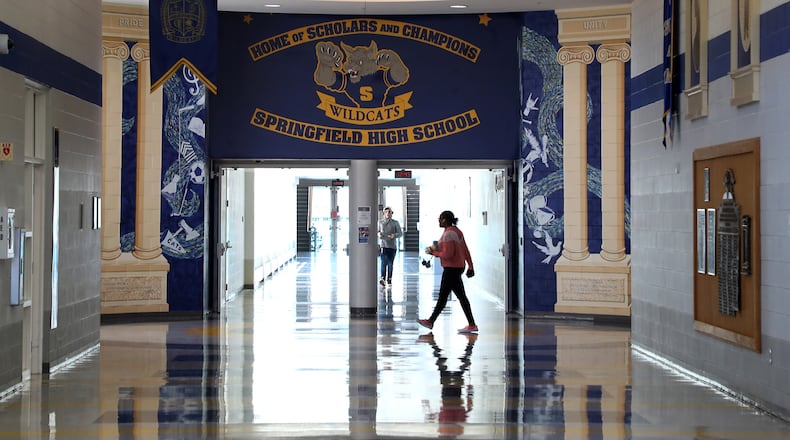The Springfield school district put a $13,995,000 bond levy on the May 2013 ballot, seeking funds to renovate and maintain school buildings that were constructed between 2004 and 2008 with the help of state funding. Voters passed this levy, with 57.8% voting yes, and the tax was to be paid over a maximum of 12 years, according to the lawsuit documents.
The argument between the parties is about timing.
School officials issued $5.88 million in bonds in September 2013, but didn’t issue the remaining $8.11 million in bonds until six years later in November 2019. Taxpayers began paying the first part of the taxes in 2014, to cover the principal and interest on the first set of bonds.
There was language about the bonds being repaid over a maximum period not to exceed 12 years. The school district is arguing that means two separate 12-year repayment windows — they say the “final maturity” dates are Dec. 1, 2026 for the Series 2013 Bond, and Dec. 1, 2031 for the Series 2019 Bond.
According to the schools’ lawsuit, in early 2023, former Clark County Auditor John Federer told the district that collection of the bond levy would end in 2025, and current county auditor Hillary Hamilton “reaffirmed this position,” with the basis for ending the collection being that it’s 12 years from when voters approved the issue, court documents stated.
Credit: Bill Lackey
Credit: Bill Lackey
Clark County Prosecutor Dan Driscoll said this month that when school district voters approved the bond levy in 2013 they were told taxes from the levy would be collected for 12 years, but the school board “wants to force” the auditor to put the tax levy on voters’ property for six more years.
“The Clark County Prosecutor’s Office looked at the Ohio Revised Code, and determined that the school board’s request was inconsistent with what the voters of this community approved, and that continuing to collect the tax beyond the 12 years voted on would violate both the letter and the spirit of the law,” he said. “We believe that the collection of additional taxes should be done in an open and transparent manner, and the school board’s efforts fails to satisfy these standards.”
Driscoll said the county is not arguing that the schools are seeking too much money (more in tax collections than is needed to repay the $13.99 million plus interest). The county is saying that the law only allowed them to collect for the first 12 years, so whatever payment is still due is a result of the schools not planning their timing in accordance with the law, and therefore is the schools’ responsibility.
A district spokesperson said there have been several school districts in Ohio that have followed the same timing process SCSD is using.
“Their respective county auditors have collected, or are intending to collect, through the final maturity of the bonds issued by those school districts,” the spokesperson said.
Driscoll said there has been no other school district in Clark County that’s asked the county auditor to do this.
“The attorney for the school board has said that this has been done with a couple of other school districts in the Columbus area, but did not provide any documentation to back up the statement,” Driscoll said. “The attorney for the school board also did not provide any legal opinions from other jurisdictions agreeing with the school district’s position.”
In the lawsuit, the school district said the auditor’s position was a “vastly incorrect reading and application of Ohio law.”
“ORC 133.18(H) requires that the bond levy be levied and collected “for the period the securities are outstanding sufficient in amount to pay the debt charges on the securities,” Hill told the News-Sun. “Further, there are additional provisions in Chapter 133 of the ORC, when read with ORC 133.18(H), supporting the position that the bond levy must be collected through the final maturity of the school district’s bonds of 2031.”
In the county auditor’s formal response to the school district’s court complaint, Hamilton says her argument is that the ballot language for the May 2013 special election on the bond issue stated that the principal would be repaid annually over a maximum period of 12 years, and that collection for the levy cannot exceed 12 years under the ballot language and the Ohio Revised Code (ORC 133.19(B)(2).
“(The school district) caused its own injury by failing to use all bonds in 2013,” Hamilton’s filing stated. She asked that the court deny the “writ of mandamus” that the schools requested.
The district spokesperson said the school district has had preliminary conversations with various trade associations about the matter, but that those groups have not taken a position on this issue.
Driscoll said the auditor’s office spoke to someone at the Ohio Department of Taxation, who did not say the department agreed with the school district, but that they have not taken a position on the issue either.
School district officials say they still have to cover debt service payments on the outstanding $7.89 million they owe, via payments of more than $1 million in each of the six years from 2026-31 (a total of roughly $7.2M principal and $700K interest).
“If the County Auditor stops collecting on the 2013 Bond Levy in 2025 as she has promised, the school district will have no revenue source to pay the remaining principal and interest due on the Series 2013 Bonds and on the Series 2019 Bonds which will be due beginning June 1, 2026,” the schools’ lawsuit says.
Springfield City Schools officials said the payments would have to come instead from funds the district “would otherwise spend on providing services and education to its students.”
Driscoll said the county’s position aims to protect the public.
“This lawsuit is a direct result of our staunch defense of the taxpayers in this community from unfair taxation,” Driscoll said. “We look forward to continuing that defense as this case moves forward.”
About the Author



